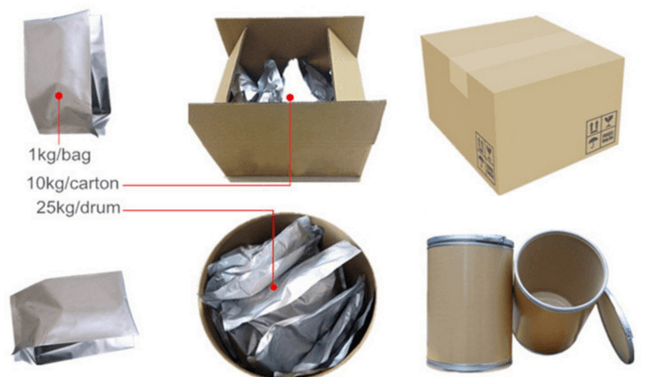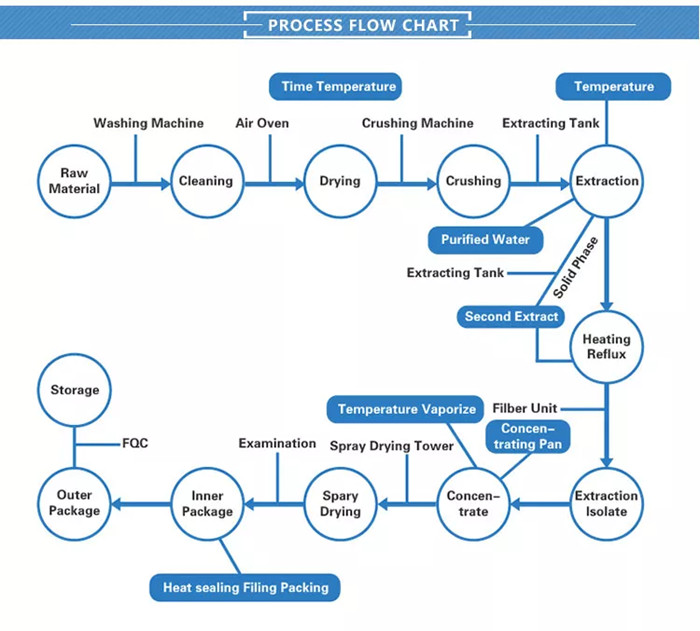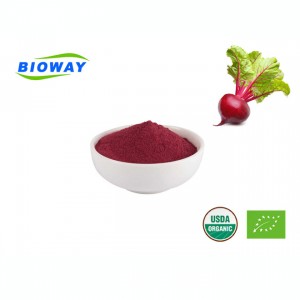Certified Organic Matcha Powder
Organic matcha powder is a finely ground powder made from shade-grown tea leaves, typically from the Camellia sinensis plant. The leaves are carefully grown and shaded from sunlight to enhance their flavor and color. The highest quality matcha powder is prized for its vibrant green color, which is achieved through meticulous cultivation and processing techniques. The specific varieties of tea plants, cultivation methods, growing regions, and processing equipment all play a role in producing high-quality matcha powder. The production process involves carefully covering the tea plants to block sunlight and then steaming and drying the leaves before grinding them into a fine powder. This results in a vibrant green color and a rich, flavorful taste. Contact us for more information: grace@biowaycn.com.
| Product name | Organic Matcha Powder | Lot No. | 20210923 |
| Examination Item | Specification | Result | Test Method |
| Appearance | Emerald Green powder | Confirmed | Visual |
| Aroma and taste | Matcha tea has a special fragrance and a delicious taste | Confirmed | Visual |
| Total Polyphenols | NLT 8.0% | 10 65% | UV |
| L-Theanine | NLT 0.5% | 0.76% | HPLC |
| Caffeine | NMT 3.5% | 1 5% | |
| Soup color | Emerald Green | Confirmed | Visual |
| Mesh Size | NLT80% through 80 mesh | Confirmed | Sieving |
| Loss on drying | NMT 6.0% | 4 3% | GB 5009.3-2016 |
| Ash | NMT 12.0% | 4 5% | GB 5009.4-2016 |
| Packing density,g/L | Natural accumulation:250~400 | 370 | GB/T 18798.5-2013 |
| Total Plate Count | NMT 10000 CFU/g | Confirmed | GB 4789.2-2016 |
| E.coli | NMT 10 MPN/g | Confirmed | GB 4789.3-2016 |
| Net content, kg | 25±0.20 | Confirmed | JJF 1070-2005 |
| Packing and Storage | 25kg standard, store well sealed and protected from heat, light, and moisture. | ||
| Shelf Life | Minimum 18 months with proper storage | ||
1. Organic Certification: Matcha powder is made from tea leaves grown and processed without synthetic pesticides, herbicides, or fertilizers, meeting organic standards.
2. Shade-Grown: High-quality matcha powder is made from tea leaves shaded from direct sunlight before harvest, enhancing flavor, and aroma, and resulting in a vibrant green color.
3. Stone-Ground: Matcha powder is produced by grinding shaded tea leaves using granite stone mills, creating a fine, smooth powder with a consistent texture.
4. Vibrant Green Color: Premium organic matcha powder is known for its bright green color, reflecting high quality and rich nutrient content due to shading and cultivation techniques.
5. Rich Flavor Profile: Organic matcha powder offers a complex, umami-rich flavor with vegetal, sweet, and slightly bitter notes influenced by tea plant variety and processing methods.
6. Versatile Use: Matcha powder is suitable for various culinary applications, including traditional tea, smoothies, lattes, baked goods, and savory dishes.
7. Nutrient-Rich: Organic matcha powder is nutrient-dense, containing antioxidants, vitamins, and minerals due to the consumption of whole tea leaves in powdered form.
1. High Antioxidant Content: Organic matcha powder is rich in antioxidants, particularly catechins, which are associated with a reduced risk of chronic diseases and cell protection from free radicals.
2. Enhanced Calmness and Alertness: Matcha contains L-theanine, an amino acid that promotes relaxation and alertness, potentially improving concentration and reducing stress.
3. Improved Brain Function: The combination of L-theanine and caffeine in matcha may support cognitive function, memory, and attention.
4. Boosted Metabolism: Some studies suggest that matcha powder compounds, especially catechins, may help increase metabolism and promote fat oxidation, potentially aiding in weight management.
5. Detoxification: Matcha’s chlorophyll content may support the body’s natural detoxification processes and help eliminate harmful substances.
6. Heart Health: The antioxidants in matcha, particularly catechins, may help lower cholesterol levels and reduce the risk of heart disease.
7. Enhanced Immune Function: The catechins in matcha powder have antimicrobial properties, potentially supporting the immune system.
Organic matcha powder has various uses due to its vibrant color, unique flavor, and nutrient-rich composition. It is commonly used for:
1. Matcha Tea: Whisking the powder with hot water creates a frothy, vibrant green tea with a rich, umami flavor.
2. Lattes and Beverages: It is used to make matcha lattes, smoothies, and other beverages, adding vibrant color and distinct flavor.
3. Baking: Adding color, flavor, and nutritional benefits to cakes, cookies, muffins, and pastries, as well as frosting, glazes, and fillings.
4. Desserts: Enhancing the visual appeal and taste of desserts such as ice cream, puddings, mousse, and truffles.
5. Culinary Dishes: Used in savory applications like marinades, sauces, dressings, and as a seasoning for noodles, rice, and savory snacks.
6. Smoothie Bowls: Adding vibrant color and nutritional benefits as a topping or incorporated into the smoothie base.
7. Beauty and Skincare: Incorporating matcha powder for its antioxidant properties in facial masks, scrubs, and skincare formulations.
Packaging And Service
Packaging
* Delivery Time: Around 3-5 workdays after your payment.
* Package: In fiber drums with two plastic bags inside.
* Net Weight: 25kgs/drum,Gross Weight: 28kgs/Drum
* Drum Size & Volume: I.D.42cm × H52cm, 0.08 m³/ Drum
* Storage: Stored in a dry and cool place, keep away from strong light and heat.
* Shelf Life: Two years when properly stored.
Shipping
* DHL Express, FEDEX, and EMS for quantities less than 50KG, usually called as DDU service.
* Sea shipping for quantities over 500 kg; and air shipping is available for 50 kg above.
* For high-value products, please select air shipping and DHL express for safety.
* Please confirm if you can make the clearance when goods reach your customs before placing an order. For buyers from Mexico, Turkey, Italy, Romania, Russia, and other remote areas.
Payment And Delivery Methods
Express
Under 100kg, 3-5Days
Door to door service easy to pick up the goods
By Sea
Over300kg, Around 30 Days
Port to port service professional clearance broker needed
By Air
100kg-1000kg, 5-7Days
Airport to airport service professional clearance broker needed
Production Details (Flow Chart)
1. Sourcing and Harvesting
2. Extraction
3. Concentration and Purification
4. Drying
5. Standardization
6. Quality Control
7. Packaging 8. Distribution
Certification
It is certified by ISO, HALAL, and KOSHER certificates.
FAQ (Frequently Asked Questions)
Q: How do you know if matcha is organic?
A: To determine if matcha is organic, you can look for the following indicators:
Organic Certification: Check if the matcha powder has been certified organic by a reputable certification body. Look for organic certification logos or labels on the packaging, such as USDA Organic, EU Organic, or other relevant organic certification marks.
Ingredient List: Review the ingredient list on the packaging. Organic matcha powder should explicitly state “organic matcha” or “organic green tea” as the primary ingredient. Additionally, the absence of synthetic pesticides, herbicides, or fertilizers should be indicated.
Origin and Sourcing: Consider the origin and sourcing of the matcha powder. Organic matcha is typically sourced from tea farms that adhere to organic farming practices, such as avoiding synthetic chemicals and pesticides.
Transparency and Documentation: Reputable suppliers and manufacturers of organic matcha powder should be able to provide documentation and transparency regarding their organic certification, sourcing practices, and compliance with organic standards.
Third-Party Verification: Look for matcha powder that has been verified by third-party organizations or auditors specializing in organic certification. This can provide additional assurance of the product’s organic status.
By considering these factors and conducting thorough research, you can make an informed decision when determining if matcha powder is organic.
Q: Is it safe to drink matcha powder everyday?
A: Drinking matcha powder in moderation is generally considered safe for most people. However, it’s important to be mindful of potential considerations when consuming matcha on a daily basis:
Caffeine Content: Matcha contains caffeine, which can affect individuals differently. Excessive caffeine intake may lead to side effects such as anxiety, insomnia, or digestive issues. It’s essential to monitor your overall caffeine consumption from all sources if you plan to drink matcha daily.
L-theanine Levels: While L-theanine in matcha can promote relaxation and focus, excessive consumption may not be suitable for everyone. It’s advisable to be aware of your individual response to L-theanine and adjust your intake accordingly.
Quality and Purity: Ensure that the matcha powder you consume is of high quality and free from contaminants. Choose reputable sources to minimize the risk of consuming low-quality or adulterated products.
Personal Sensitivities: Individuals with specific health conditions, sensitivities to caffeine, or other dietary considerations should consult with a healthcare professional before incorporating matcha into their daily routine.
Balanced Diet: Matcha should be part of a balanced and varied diet. Relying excessively on any single food or beverage may lead to an imbalance in nutrient intake.
As with any dietary change, it’s advisable to listen to your body, monitor your response to matcha consumption, and seek guidance from a healthcare professional if you have any concerns or underlying health conditions.
Q: Which grade of matcha is healthiest?
A: The health benefits of matcha are primarily derived from its nutrient content, particularly its high levels of antioxidants, amino acids, and other beneficial compounds. When considering the healthiest grade of matcha, it’s important to understand the different grades and their characteristics:
Ceremonial Grade: This is the highest quality matcha, known for its vibrant green color, smooth texture, and complex flavor profile. Ceremonial grade matcha is typically used in traditional tea ceremonies and is prized for its rich nutrient content and balanced flavor. It is often considered the healthiest grade due to its superior quality and careful cultivation.
Premium Grade: Slightly lower in quality compared to ceremonial grade, premium grade matcha still offers a high concentration of nutrients and a vibrant green color. It is suitable for daily consumption and is often used for making matcha lattes, smoothies, and culinary creations.
Culinary Grade: This grade is more suitable for culinary applications, such as baking, cooking, and blending into recipes. While culinary grade matcha may have a slightly more astringent flavor and a less vibrant color compared to ceremonial and premium grades, it still retains beneficial nutrients and can be a part of a healthy diet.
In terms of health benefits, all grades of matcha can offer valuable nutrients and antioxidants. The healthiest grade for an individual depends on their specific preferences, intended use, and budget. It’s important to choose matcha from reputable sources and consider factors such as taste, color, and intended application when selecting the most suitable grade for your needs.
Q: What is organic Matcha powder used for?
A: Organic matcha powder is used for a variety of culinary, beverage, and wellness applications due to its vibrant color, unique flavor profile, and nutrient-rich composition. Some common uses of organic matcha powder include:
Matcha Tea: The traditional and most well-known use of matcha powder is in the preparation of matcha tea. The powder is whisked with hot water to create a frothy, vibrant green tea with a rich, umami flavor.
Lattes and Beverages: Matcha powder is often used to make matcha lattes, smoothies, and other beverages. Its vibrant color and distinct flavor make it a popular ingredient in various drink recipes.
Baking: Matcha powder is used in baking to add color, flavor, and nutritional benefits to a wide range of recipes, including cakes, cookies, muffins, and pastries. It can also be incorporated into frosting, glazes, and fillings.
Desserts: Organic matcha powder is commonly used in the preparation of desserts such as ice cream, puddings, mousse, and truffles. Its unique flavor and color can enhance the visual appeal and taste of sweet treats.
Culinary Dishes: Matcha powder can be used in savory culinary applications, including in marinades, sauces, dressings, and as a seasoning for dishes such as noodles, rice, and savory snacks.
Smoothie Bowls: Matcha powder is often added to smoothie bowls for its vibrant color and nutritional benefits. It can be used as a topping or incorporated into the smoothie base for added flavor and color.
Beauty and Skincare: Some beauty and skincare products incorporate matcha powder for its antioxidant properties. It can be found in facial masks, scrubs, and other skincare formulations.
Overall, organic matcha powder offers versatility in both sweet and savory recipes, making it a popular ingredient in a wide range of culinary and wellness applications.
Q: Why is matcha so expensive?
A: Matcha is relatively expensive compared to other types of tea due to several factors:
Labor-Intensive Production: Matcha is produced through a labor-intensive process that includes shading the tea plants, hand-picking the leaves, and stone-grinding them into a fine powder. This meticulous process requires skilled labor and time, contributing to its higher cost.
Shade-Grown Cultivation: High-quality matcha is made from tea leaves that are shaded from direct sunlight for a few weeks before harvest. This shading process enhances the flavor, aroma, and nutrient content of the leaves but also increases production costs.
Quality Control: The production of premium matcha involves strict quality control measures to ensure that only the finest leaves are used. This attention to quality and consistency contributes to the higher price of matcha.
Limited Availability: Matcha is often produced in specific regions, and the supply of high-quality matcha may be limited. Limited availability, combined with high demand, can drive up the price of matcha.
Nutrient Density: Matcha is known for its high concentration of antioxidants, amino acids, and other beneficial compounds. Its nutrient density and potential health benefits contribute to its perceived value and higher price point.
Ceremonial Grade: The highest quality matcha, known as ceremonial grade, is particularly expensive due to its superior taste, vibrant color, and balanced flavor profile. This grade is often used in traditional tea ceremonies and is priced accordingly.
Overall, the combination of labor-intensive production, quality control, limited availability, and nutrient density contributes to the relatively higher cost of matcha compared to other types of tea.
Q: Is light or dark matcha better?
A: The color of matcha, whether light or dark, does not necessarily indicate its quality or suitability. Instead, the color of matcha can be influenced by various factors such as the tea plant variety, growing conditions, processing methods, and intended use. Here’s a general understanding of light and dark matcha:
Light Matcha: Lighter shades of matcha are often associated with a more delicate flavor profile and a slightly sweeter taste. Lighter matcha may be preferred for traditional tea ceremonies or for those who enjoy a milder, smoother flavor.
Dark Matcha: Darker shades of matcha can have a more robust, earthy flavor with a hint of bitterness. Darker matcha may be favored for culinary applications, such as baking or cooking, where a stronger flavor can complement other ingredients.
Ultimately, the choice between light and dark matcha depends on personal preference and the intended use. When selecting matcha, it’s important to consider factors such as grade, flavor profile, and the specific application, rather than solely focusing on the color. Additionally, the quality, freshness, and overall taste of the matcha should be the primary considerations when determining which type of matcha is better suited for your needs.

















